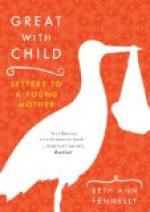Sir Charles Bell thinks that the common disease of infants called diabetes, arises from their being permitted to sleep on their backs; and that by breaking up the habit of lying in this position, and accustoming them to lie on their sides, we shall prevent it. I doubt whether the effect here referred to, is ever the result of such a cause. Still I am as much opposed to the habit of sleeping on the back, as Sir Charles Bell. It is quite injurious to free respiration.
Closely allied to the subject of bodily position in general, is the state of particular organs; especially the stomach and the senses. I have already intimated that in order to have an infant sleep quietly, it is desirable to darken the room. This is the more necessary, where infants are unnaturally wakeful. In such cases, not only light should be excluded from the eye, but sounds from the ear, odors from the nostrils, &c. A remarkably full stomach is in the way of going quietly to sleep, whether the person be old or young. Neither infants nor adults ought to take food for some time previous to their going to sleep for the night. Great bodily heat, as well as too great cold, is also unfavorable. If too hot, the temperature of the infant should be somewhat reduced by exposure to the air; if too cold, it should be raised in a natural, healthy, and appropriate manner.
SEC. 8. State of the Mind.
In giving directions how to procure pleasant dreams, Dr. Franklin mentions as a highly important requisition, the possession of a quiet conscience. A wise prescription, no doubt.
But infants, as well as adults, in order to sleep quietly, should have their minds and feelings in a state of tranquillity. The youngest child has its “troubles;” and it is highly important, if not indispensable, to healthy sleep, that the mother take all reasonable pains to remove them before sleep is induced.
We sometimes hear about children crying themselves to sleep, as if it were a matter of no consequence; and sometimes, as if it were, on the contrary, rather desirable. But is the sleep of an adult satisfying, who goes to bed in trouble, and only sleeps because nature is so exhausted that she cannot bear the protracted watchfulness any longer? Why then should we expect it, in the case of the infant?
I know an excellent father who is so far from believing this doctrine, that he silences the cries of his child by the word of command—and believes that in so doing, he promotes both his health and his happiness. He would no more let him cry himself to sleep than he would let him cough himself to sleep; though both crying and coughing, in their places, may be and undoubtedly are salutary.
Whatever may be the age and circumstances of an individual, he ought to retire for rest with a cheerful mind. All anxiety about the future, all regret about the past, all plans even, in regard to the business or amusement of the morrow, should be kept wholly out of the mind. We should yield ourselves up to the arms of sleep with the same quietude as if life were finished, and we had nothing more to do or think of.




